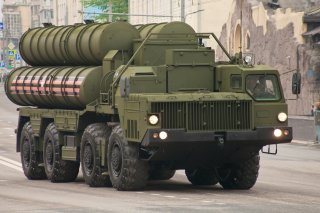Turkey Needs the S-400, Says Defense Expert
The question that may need to be asked is, who does Turkey fear will attack its air space? As a NATO member, it shouldn’t expect other alliance nations including Romania, Bulgaria, or even regional rival Greece to launch an attack.
Days after a former Turkish government minister called for Ankara to sell its Russian-made S-400 Triumf air defense systems, another Turkish defense and security expert has said the platform is a necessary part of Turkey’s aerial protection network.
Turkish businessman Cavit Caglar, who served as minister of state in the early 1990s, suggested last week that Ankara should dump the S-400—and find a foreign buyer, perhaps India or Pakistan—and that such a move could win the good graces of Washington. It might be a necessary first step that could see Turkey find a way back into the F-35 Joint Strike Fighter program, from which the NATO member was expelled for adopting the S-400 in 2017.
Washington and NATO argued the system was incompatible with the F-35, and that operating both would compromise the stealth capabilities and safety of the aircraft.
“Not So Fast,” Said Another Expert
Caglar’s suggestion hasn’t been acknowledged by Ankara to date, but Turan Oguz, a Turkish defense and security expert, warned that his nation doesn’t have an air defense system that could protect Turkish airspace from medium-range ballistic missiles.
Oguz told the Türkiye Today newspaper that the S-400 can’t be integrated into NATO’s air defense network, but claims that Turkey, “has successfully incorporated them into its radar network and maintains full operational control,” while the paper noted, “the S-400 protects Turkish airspace from ballistic missiles within a 400-kilometer range. The Long Ranger Surface to Air Missile (SIPER) Air Defense system, set to enter service this year, protects a 100-kilometer range and currently lacks ballistic protection.”
Who Does Turkey Fear?
Of course, the question that may need to be asked is, who does Turkey fear will attack its air space? As a NATO member, it shouldn’t expect other alliance nations including Romania, Bulgaria, or even regional rival Greece to launch an attack.
Syria to the south is a Russian partner, while Armenia is hardly likely to launch an attack on Turkey—which would result in NATO’s “Article 5” being invoked, which would bring all of the alliance members to Ankara’s side.
In truth, the greatest threat might be Russia, across the Black Sea, and military analysts for years have questioned why Turkey would want to protect its air space using a potential adversary’s air defense system. This could help explain why as of the end of last year, the S-400 hadn’t been made operational. Turkish Defense Minister Ya ar Güler told reporters that the Triumf would only be utilized when needed.
Part of a Deeper Issue
This issue goes much deeper than the S-400 Triumf.
“Oguz pointed out that there are nearly thirty points of disagreement between the U.S. and Turkey. He noted that there are legislative proposals in Congress for even trivial matters, which could become laws and lead to new sanctions against Turkey if any negative developments occur,” the Turkish newspaper added.
Ankara failed to reach an agreement with Washington for the possible sale of the Patriot missile air defense system, in part due to Turkey’s calls for taking on some of the manufacturing of the system domestically. When Washington wouldn’t budge on some of the demands, Ankara looked elsewhere and that included China.
In 2013, Turkey announced it would acquire the Chinese FD-2000, which, as War on the Rocks reported, could have included “some Turkish licensed production.” Ankara eventually dropped the Chinese offer but then turned to Russia – which had long sought to split Turkey from NATO.
In summary, Turkey likely tried to call America’s bluff and get Washington to bend on the terms of the Patriot air defense deal. When that didn’t happen, Ankara crossed the proverbial Rubicon, and now finds itself with an air defense system it probably never wanted in the first place.
The irony is that by wanting to play a role in the production of the Patriot, Turkey was expelled from the F-35 Lightning II program, and has an air defense system made by the one nation that would most likely launch an attack!
About the author
Peter Suciu is a Michigan-based writer. He has contributed to more than four dozen magazines, newspapers, and websites with over 3,200 published pieces over a twenty-year career in journalism. He regularly writes about military hardware, firearms history, cybersecurity, politics, and international affairs. Peter is also a Contributing Writer for Forbes and Clearance Jobs. You can follow him on Twitter: @PeterSuciu. You can email the author: [email protected].
Image Credit: Mikhail Semenov / Shutterstock.com


